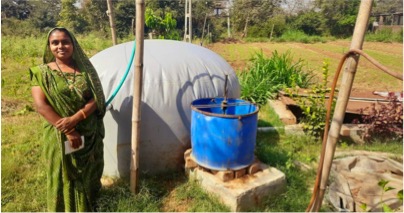Zakariyapura village in Borsad taluka, Anand district, Gujarat has become a model for other villages across India by embracing small-scale biogas facilities in every household that owns milch cattle.
In a typical biogas facility, cow dung undergoes anaerobic (absence of oxygen) digestion by bacteria, with the help of conventional technology, to produce biogas comprising 50-55 per cent methane and 30-35 per cent carbon dioxide. Minor amounts of hydrogen sulphide and moisture are also produced.
This gas serves as a direct cooking fuel, effectively replacing traditional sources such as wood and fossil fuels like liquefied petroleum gas (LPG). These flexible biogas plants are easy to instal and can be set up quickly, are portable, demand minimal maintenance and are more cost-effective compared to conventional biogas digesters.
The initiative can be traced back to 2019 when officials from the National Dairy Development Board (NDDB) facilitated meetings and educational visits for women from Zakariyapura to observe flexible biogas units in an adjacent village, Mujkuva, situated in Anklav taluka of Anand district. Witnessing these flexi biogas plants for the first time inspired them to bring similar models to their own village.
With the assistance of NDDB, all 368 households with livestock were equipped with flexi biogas plants of 2 cubic metres capacity. Each of these plants requires about 50 kilogrammes of animal dung daily.
The cost of setting up a plant was between Rs 30,000 and Rs 32,000. NDDB paid for half the cost, while the households contributed the remaining. This contribution can be recovered through the sale of slurry.
All 368 biogas plants have been geotagged and two villagers from the local community have been trained to address any immediate operational problem.
The installation company, in collaboration with NDDB personnel, conducted a series of training sessions to educate local women on plant operation, maintenance and the potential economic and environmental advantages. Women dairy farmers already being a part of a milk cooperative in the village facilitated their efforts to persuade all women farmers to adopt these decentralised biogas units.
A noteworthy development in the village is the establishment of a centralised slurry processing centre. Each biogas digester produces approximately 80 litres of slurry every day. In March 2020, the village, along with adjacent Mujkuva, pioneered India’s first women-managed manure cooperative, aiming to acquire, process and market slurry-based fertiliser.
To ensure fairness, a transparent slurry procurement system was implemented similar to that of milk, where women farmers are compensated based on the quality of slurry supplied (ranging from Rs 0.25-2 per litre), assessed using predefined rate charts based on dissolved solids and electrical conductivity measurements.
Unlike milk collection, where farmers deliver milk to a central point, the cooperative arranges for the collection of slurry directly from the farms or households, minimising effort for the women managing the biogas units.
NDDB has developed a slurry applicator with a 3,500 litre capacity for efficient collection from these plants. Payments for slurry sales are deposited directly into the individual beneficiaries’ bank accounts.



























